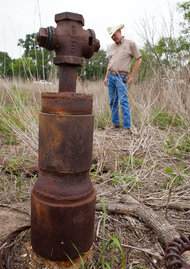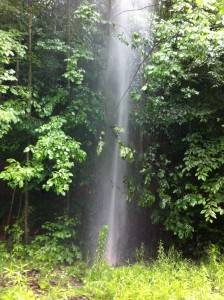Abandoned Oil Wells and the Dangers They Pose
Abandoned oil wells and oil extraction equipment are common problems that plague Texas residents. One of the largest concerns about this problem is that many oil wells have been left poorly maintained and not sealed. Some linger from the early- to mid-20th century, before current standards were set in place. More recently, regulators have worked to plug and seal the old wells, so they do not act as a channel for liquid pollutants to enter groundwater. But some fear that the recent surge in oil drilling, brought about by the modern practice of hydraulic fracturing (fracking), will catalyze troublesome encounters with the old wells.

Abandoned oil and gas wells are all over the United States in areas such as Texas, New York and Pennsylvania that were prominent regions for oil drilling. An abandoned or “orphaned” well is a well that is no longer in use or that is in such an unusable state that oil and gas can no longer be obtained from it. While there have been great efforts to remedy this problem, in Texas alone there are still more than 8,400 known uncapped wells all over the state.
Uncapped wells pose dangers environmentally and physically. There is the possibility of children or small animals falling into them and seriously harming and potentially killing themselves. They serve as potential groundwater contamination routes and allow poor quality/contaminated water to move between aquifers, further polluting them.

Aside from the general risks abandoned oil wells pose, drilling near them causes even greater dangers. There are still many undocumented wells throughout the U.S. that pose potential hazards. By drilling near abandoned and unknown wells, methane gas becomes more pressurized and works to find a way to the surface. If a high volume of methane gas comes together it creates an explosion, something we would definitely want to avoid. When drilling near wells the potential for an excess of methane to come together and explode becomes exponentially greater. A well in Tioga County, Pennsylvania that was 5,385 feet deep, and lined with four layers of metal casing, is an excellent example of the potential dangers. Eighty years and four months after being dug and used, the well was part of an unfortunate incident — even though it had been inactive for generations. The well played a key role in a methane gas leak that led to a 30-foot geyser of gas and water spraying out of the ground for more than a week. Since there are so many unknown wells all over the state you can see how this could be a problem.
Even wells that have been inactive for extremely long periods of time can still pose a threat. Abandoned oil and natural gas wells can serve as conduits for injected oil and natural gas drilling waste fluids to migrate from underground to an area near the surface where the fluids can break out of the abandoned wells and contaminate groundwater, raising the possibility that abandoned wells can serve as similar conduits for injected hydraulic fracturing fluids.Ed Walker, the general manager of the Wintergarden Groundwater Conservation District in South Texas, said that a few years ago, water came up out of an abandoned 1940s-era well that lay slightly more than a quarter-mile from a disposal well.
Currently the Texas Railroad Commission regulates and oversees any and all drilling in Texas and there are measures in place to make sure these wells are taken care of, however there are still thousands of known wells that have not been suitably covered and filled. In order to ensure that our water supplies and air is not being contaminated we need to push to make sure these wells are properly sealed and all unknown wells are found and dealt with accordingly.